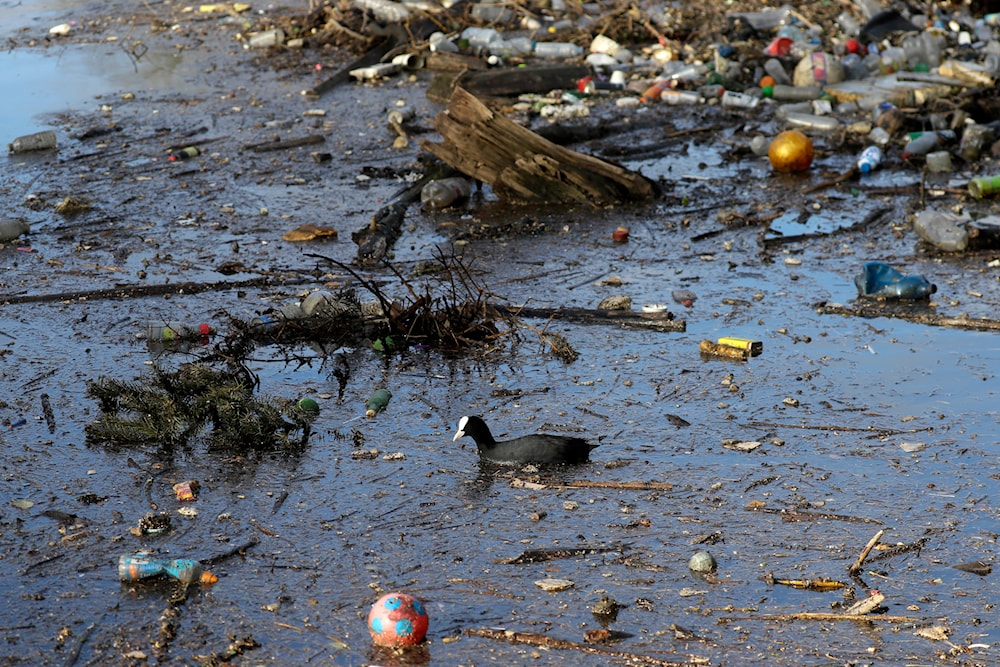England's water firms saw 30% rise in pollution incidents in 2024
England failed to meet its pollution reduction targets, recording the highest number of pollution incidents in a decade in 2024 despite new regulations being put in place for corporations to reduce pollution.
-

A coot swims through pollution gathered on the side of the Grand Union Canal in London, on Thursday, January 21, 2021. (AP)
In 2024, water companies in the United Kingdom failed to meet their pollution reduction targets, as they recorded over 2,000 incidents, twice the limit set by the Environment Agency, The Guardian reported on Wednesday.
Freedom of information data reveals that water companies were given an Environment Agency target to cut pollution incidents by 40%, but instead of reducing spills, they recorded a 30% increase, with 2024 seeing the highest number of pollution incidents in a decade, 2,487 incidents.
A new report from the charity Surfers Against Sewage, which analyzed discharge data, public health reports, and crowdsourced pollution tracking through its app, found that England’s water industry failed to meet its pollution reduction targets during the 2020 to 2025 investment period.
The report further highlights that water companies paid shareholders £1.2 billion in 2023-24, even as they failed to curb pollution and oversaw record durations of raw sewage discharges into England's waterways, despite new regulations designed to limit executive bonuses in cases of environmental negligence.
“The numbers are staggering: record hours of sewage discharges, huge bill increases, thousands of people becoming ill, and yet still the industry has the gall to still pay out billions of bill-payer money to shareholders. Things could not be clearer: this broken system needs urgent and radical reform," Giles Bristow, chief executive of Surfers Against Sewage, told The Guardian.
“We can change things if we change the way our system is run. Across the globe, the norm is to manage water at a local level, rather than the 100% private ownership model in place in England that has proved catastrophic for the environment and public health," Bristow added.
The charity operates a sickness reporting system that allows individuals to log suspected illnesses linked to contaminated water exposure, putting swimmers at particular risk from harmful bacteria like E. coli when entering waters recently affected by sewage discharges.
5 reports of illnesses per day
Through its sickness monitoring app in 2024, Surfers Against Sewage recorded 1,853 cases of suspected waterborne illness, averaging five reports per day, with 331 of these cases requiring medical attention where doctors confirmed sewage pollution as the cause in 79% of instances.
Hundreds suffered from gastroenteritis and chest infections, along with serious bacterial infections leading to hospital admissions, all linked to contaminated waterways.
While training for an Ironman race in September 2023, 28-year-old Charlie Clarke swam at Clevedon marine lake near Bristol before collapsing during a jog the following day.
After being hospitalized, ECGs and blood tests revealed through multiple examinations over four months that he had contracted a virus during his swim that led to lowered blood pressure and a minor heart condition.
Clarke explained that the experience and diagnosis significantly disrupted his daily life by preventing him from raising his heart rate during recovery, which made routine activities like cycling to work impossible, while also isolating him from his main social outlets of football and cycling with his teams for several months.
The industry group Water UK stated that while all sewage discharges are unacceptable, water firms are committing £12 billion to reduce overflow spills by nearly 50% before 2030, representing the biggest environmental investment in history to protect waterways, boost development, expand housing, ensure water security, and eliminate sewage pollution in natural water bodies.

 4 Min Read
4 Min Read










